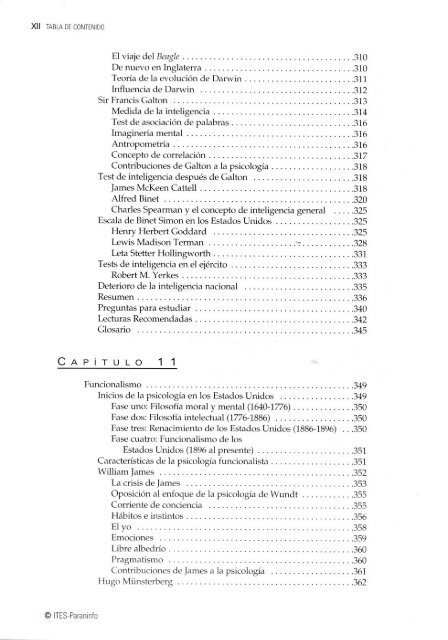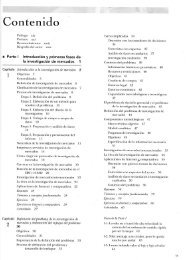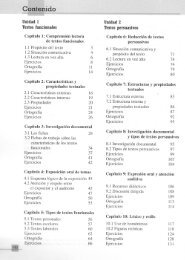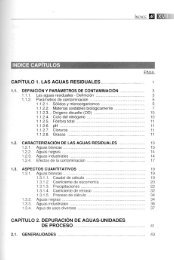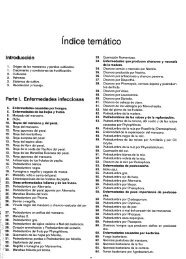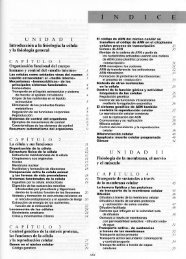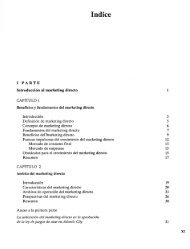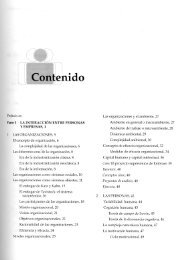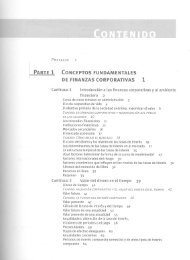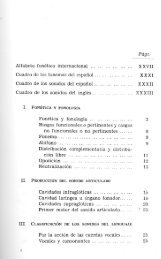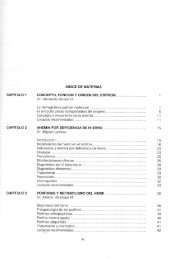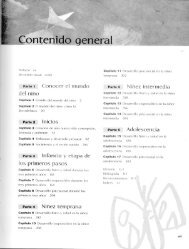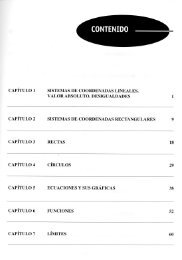Tabla de Contenido
Tabla de Contenido
Tabla de Contenido
Create successful ePaper yourself
Turn your PDF publications into a flip-book with our unique Google optimized e-Paper software.
XII TABLADECONTENIDO<br />
Elviaje<strong>de</strong>lBeagle 310<br />
De nuevo en Inglaterra 310<br />
Teoría <strong>de</strong> la evolución <strong>de</strong> Darwin .311<br />
Influencia<strong>de</strong>Darwin 312<br />
SirFrancisGalton 313<br />
Medida <strong>de</strong> la inteligencia 314<br />
Test<strong>de</strong>asociación<strong>de</strong>palabras .316<br />
Imagineríamental 316<br />
Antropometría .' 316<br />
Concepto <strong>de</strong> correlación .317<br />
Contribuciones <strong>de</strong> Galton a la psicología. . . . . . . . . . . . . . . . . . .318<br />
Test <strong>de</strong> inteligencia <strong>de</strong>spués <strong>de</strong> Galton .318<br />
JamesMcKeenCattell 318<br />
AlfredBinet 320<br />
Charles Spearman y el concepto <strong>de</strong> inteligencia general. . . . .325<br />
Escala <strong>de</strong> Binet Simon en los Estados Unidos. . . . . . . . . . . . . . . . . .325<br />
HenryHerbertGoddard 325<br />
LewisMadisonTerman : 328<br />
LetaStetterHollingworth 331<br />
Tests <strong>de</strong> inteligencia en el ejército 333<br />
RobertM.Yerkes 333<br />
Deterioro <strong>de</strong> la inteligencia nacional. . . . . . . . . . . . . . . . . . . . . . . . .335<br />
Resumen 336<br />
Preguntas para estudiar 340<br />
LecturasRecomendadas .342<br />
Glosario 345<br />
CAPíTULO 1 1<br />
Funcionalismo 349<br />
Inicios <strong>de</strong> la psicología en los Estados Unidos. . . . . . . . . . . . . . . . .349<br />
Fase uno: Filosofía moral y mental (1640-1776).. . . . . . . . . . . . .350<br />
Fase dos: Filosofía intelectual (1776-1886) """""""'" .350<br />
Fase tres: Renacimiento <strong>de</strong> los Estados Unidos (1886-1896) .. .350<br />
Fase cuatro: Funcionalismo <strong>de</strong> los<br />
Estados Unidos (1896al presente) . . . . . . . . . . . . . . . . . . . . . .351<br />
Características <strong>de</strong> la psicología funcionalista . . . . . . . . . . . . . . . . . . .351<br />
WilliamJames 352<br />
Lacrisis<strong>de</strong>James 353<br />
Oposición al enfoque <strong>de</strong> la psicología <strong>de</strong> Wundt . . . . . . . . . . . .355<br />
Corriente<strong>de</strong>conciencia 355<br />
Hábitoseinstintos .356<br />
Elyo 358<br />
Emociones 359<br />
Librealbedrío .360<br />
Pragmatismo 360<br />
Contribuciones <strong>de</strong> James a la psicología. . . . . . . . . . . . . . . . . . .361<br />
HugoMünsterberg 362<br />
@ ITES-Paraninfo


